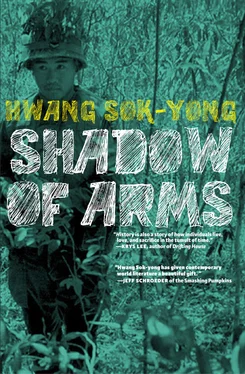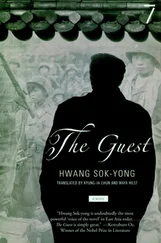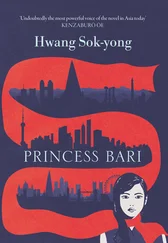“I understand it’s a start on a pigpen they plan to construct after they receive their allotment of cement.”
“Oh, that’s a very good idea. There’ll be plenty of breeding pigs and sheep brought in from abroad.”
As Pham Quyen turned away from Butler, his expression went vacant again. The parade passed the community laundry, equipped with tubs and faucets and underneath a huge water tank. Then they arrived in front of the public toilet, located in a concrete block building painted white. There were no flush toilets, but the cesspool had been dug deep enough that the excrement could accumulate several months before they would have to scoop it out with buckets. There were separate entrances for men and women with “Knock” written on the plywood doors. The ceramic toilets were a sparkling white against the cement floors.
Pham Quyen knew that the villagers would never use these facilities. They would want to grow small vegetable gardens behind their houses. Anybody who had a spade would go out back, dig a shallow hole, and deposit their waste in the earth. It was like repaying the earth for giving them food to eat. They would carefully refill the hole and stamp it down with their bare feet. The earth would become rich and when the monsoons came, everything would grow abundantly in the fertilized soil. If something was out of place in this phoenix hamlet, it was this bright white public toilet building standing at its center.
The line of people came to the children’s playground next. The local VIPs and the entourage from the provincial government were busily herding the children into the playground. Seesaws and swings, slides and monkey bars had been erected in the yard. Looking uncertain, the children reluctantly approached the play apparatus. The bigger children tried the swings, and one by one the other children started getting on the seesaws and the slides.
“The children from now on will begin to learn the value of peace in this hamlet of An Diem.”
Butler grinned widely as he spoke to General Liam, who responded in a single sentence.
“There’s no other playground like this one, not even in Saigon.”
Pham Quyen, however, did not fail to notice that the children romping on the monkey bars were pretending to shoot at one another, pretending their fingers were pistols. In loud voices they mimicked gunshots and one of them fell to the ground, pretending to be shot and dying. The adults lingered before the playground for quite a while, proud of the feat they had accomplished. Someone found a one-legged child wearing a prosthesis imported from Hong Kong. The reporters clamored about as they put the handicapped child on a swing and pulled it way back before releasing it. The cameramen were squatting, wriggling, and changing positions to try and make the most of this touching moment. It would make a very fitting picture, especially for those Americans who fell head over heels for war orphans, children in hospitals, children asleep on the back of refugees, children in unfortunate circumstances of any kind.
The procession moved on past the two-room schoolhouse and then filed past the village assembly hall, then returned to the ceremonial platform in the middle of the hamlet. Then they got into their cars and departed, leaving behind the music from the brass band, the squeals from the schoolgirls, and the applause from the villagers. The governor would never be setting foot in this place again. This time Major Pham Quyen planned to accompany the general back to Da Nang. Tonight the governor was giving a dinner party at his official residence. As he walked toward the helicopter, one of the entourage called out to him from behind, “Major, we have someone who’d like to have a word with you.”
When Pham Quyen looked back, he saw an old man who had been sitting on the platform amidst the village notables.
“What is it?”
“Well, sir, I. . we haven’t received even half of our wages yet.”
It had been arranged for the villagers, while building the An Diem hamlet, to receive one-third of their wages in American surplus wheat and the rest in rice or cash. Pham Quyen scowled at the old man.
“Didn’t you get the flour? The cost of milling wasn’t deducted. The rest will be included in the resettlement funds.”
Having so spoken, Pham Quyen took out his notebook from the pocket of his uniform jacket. He pressed down firmly with the ballpoint pen, pretending to write, and asked the old man, “What is your name and your house number?”
The old man hesitated.
“Sir. . well, I. . I only. . I only. . the villagers.”
The member of the entourage hurriedly intervened.
“Sir, he is one of the village representatives. I have all the necessary information, sir.”
Pham Quyen saw the propeller of the helicopter begin to rotate and he quickly put away his notebook.
“All right. Submit a written request directly to the authorities.”
He boarded the helicopter. As they took off, An Diem looked like a border of pebbles on the edge of a flower garden.
The general glanced over at the major and said, “So there’ll be ten more villages like that?”
“Yes, Your Excellency. This one was a model. If the plans are successfully implemented, we have an agreement with AID to set up phoenix hamlets at three hundred sites.”
The general nodded, then gave a subtle warning. “Show continued attention to the An Diem village, but no need to hurry things.”
“Yes, sir. It is the model, I understand.”
A continuous sound of gunfire came from somewhere. It seemed the guard patrol had discovered enemy troops down the bank of the Thu Bon. The gunships were cruising at a low altitude and looking down upon the jungle. Pham Quyen’s mind was busy at work. Until the other phoenix hamlets were fully settled, they’d have to post to An Diem a defense contingent at least the size of a battalion.
The light flickered. A moth, having wandered in unawares, kept batting against the covered light fixture in the milky white bathroom, its wings shuddering. Hae Jong was in the bathtub, her legs crossed and propped up straight along the tiled wall. Steam was wafting out through the open window. The mosquito net was torn; the moth must have come in through the hole. The huge shadow of the moth moved across the wall then stopped, looking like the root of a giant tree. The water was lukewarm.
Hae Jong looked down disinterestedly at her legs and pubis. Her breasts rose and fell slowly with the rhythm of her breathing, breaking the calm surface of the water. The sound of music on the radio came in through the cracked door to the next room. A swaying, soulful Supremes song gave way to the music of John Lennon and Paul McCartney. Hae Jong understood their loneliness.
How to imagine the American Dream without suffering its melancholy? They sing of a corner booth in an all-night bar, headlights whizzing over the horizon, a cattle car of a freight train rolling endlessly over red dirt, the drunkard in a back alley at dawn, old folks sitting on a park bench in a small town, a young boy lounging in front of a juke box, a city park enveloped in smog, a rainy November highway, all this in their song of loneliness. The Americans are still kids. Kids who belong in Sunday school. There they learn of the whites, of power, of rules and responsibilities.
Lennon sings: “All the lonely people, where do they all come from?”
McCartney sings: “All the lonely people, where do they all come from?”
Hae Jong scooped up some water and poured it over her breasts. She leaned her head back into the tub, dipping her wet hair into the water. Jerry, Thomas, and James. . she visualized each of their faces. Jerry was a professional soldier, sweet, short and stout with a very red face. Thomas was tall, with a long chin, dark hair and a dark beard, a real joker.
Читать дальше












